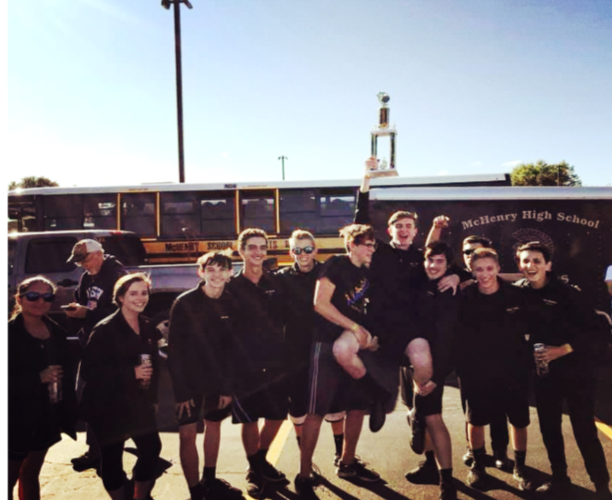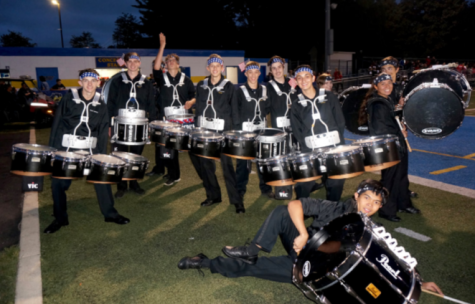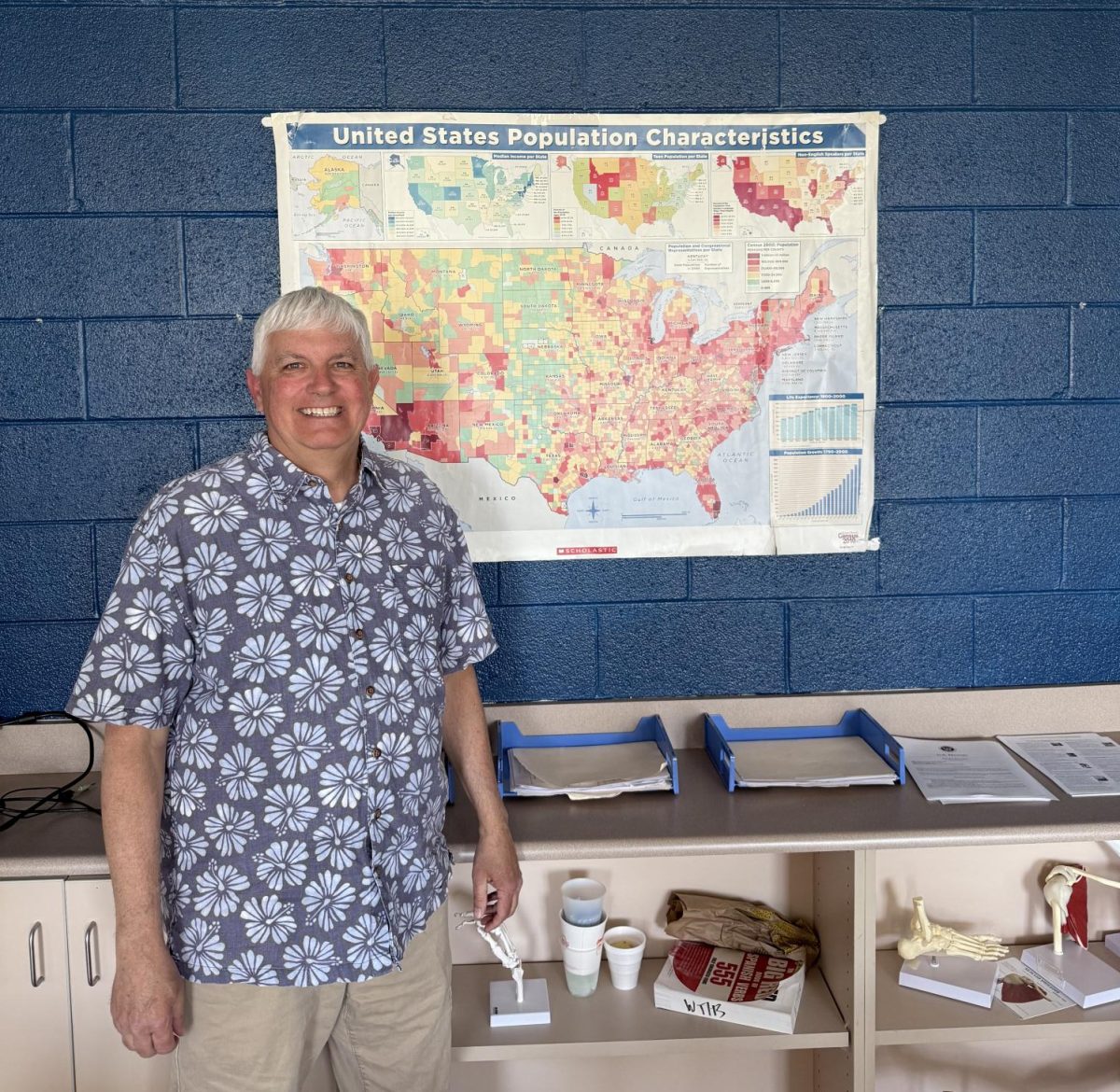Dynamics of the Drumline
October 1, 2018
After taking the first win of the of the marching band competition season at Knights Band Festival and Competition which was held on September 9th, hosted by Grayslake North High School, and scoring another first place win at the Chicagoland Marching Band Festival hosted by Wheeling Public High School, Warren’s amazing marching band is getting geared up for their next competitions.
But what does it take for the band, and for drumline especially, to get to the level that they are at? What does it take for our beloved Blue Devils Drumline to bring home the award of “Best Percussion” and various other first place wins?
Drumline is one of the most noticeable and most well known sections in marching band, but how does one reach the level of marching and excellence that they present on a day to day basis? What are the struggles that the individual players face with each instrument? What is the dynamic between all of the students on the drumline and how does this affect their performance?
The drumline is comprised of three different sections of instruments: the snare line, the tenor line, and the bass line. Each instrument has its own advantages and disadvantages.
To start, “Snare line is the only line that plays with a ‘traditional’ grip, which is holding the stick practically sideways with your left hand.” Jon Locke, one of the drumline instructors, explains. Locke is the snare line director for Warren and has been working with them for 7 years. Traditional grip is defined as a grip where the right hand uses an overhand grip and the left hand uses an underhand grip, whereas match grip, a different style of playing, allows both hands to play with an overhand grip. “It is a very tough grip the master,” says Locke.
Although the snare players have to play traditional grip while on the field, they do have an advantage to their playing as the “snare line is one of the sections that a student can learn quickly and is the lightest of the three.”
On the other hand, bass drums on the marching line are comprised of multiple sized basses, each with their own pitches and sounds. As head of the bass line, Zach Relova shows off their charms, explaining how “Basses are unique in that we usually don’t play all at once. We play consecutively one after another at blazing speeds and usually we have to play 3 to 4 notes in the span of half a second so we need to count heavily in our heads to play on time with the right spacing between each note.” This process of players playing different pitches at spaced intervals are called splits.
Last but not least, the tenor section is a section made up of instruments that include 5 differently pitched drums per player. “It’s a challenge to be able to play five different drums cleanly and accurately… it requires a lot of thinking. A benefit of playing the tenors is the fact that not only does it sound cool because the drums are all different pitches, but there are a lot of things you can play,” Dylan Montellano, the drumline’s head tenor player, points out, “For example, last year we played Wii music.”
Our Blue Devils Drumline goes through rigorous training throughout the marching season to get ready for competitions and other events.
“Drumline meets once a week in the month of June to work on marching technique, show music, and exercises. In July, the drumline meets with the rest of the band for a few rehearsals including a week long of band camp, where they learn to march through their show,” Jon Locke shares.
Montellano elaborates, “Starting from the end of the year, we meet at least once a week (usually Wednesday nights from 5:30-9) every week. Over the summer, we worked with the whole band about once or twice a month from 5:30-9. Then, at the beginning of August, we have a five day band camp that lasts from 9:00am-5:00pm every single day. During the school year, the whole band has weekly Wednesday night rehearsals from 6-9, with extra practices on occasion.”
“We spend much of our rehearsal time warming up and refining our movements, trying to commit it all to memory so when we get on the field it’s all second nature and clean,” Relova adds.
Through all of their hard practice, drumline has performed outstandingly at all of the competitions that the Warren Blue Devils Marching Band has attended, taking first place at Knight’s Band Festival and Competition including “Best Auxiliary”, or color guard, and “Best Percussion”, which includes drumline and the front ensemble.
As mentioned earlier, the band has also won first place at the Chicagoland Marching Band Festival in Wheeling, Illinois, as well as Grand Champ of the night. Jon Locke is impressed with the drumline’s performance at these events, highlighting that “the drumline performed very well for their first competition at Grayslake North and an early season show. . . they proved to dominate the competition by taking 1st place in the Best Percussion category.”
Even with such big titles won, drumline members and their instructors agree that there is still much work to be done in order to improve over the next few weeks in preparation for the Greendale Competition, and later, for the Downers Grove Competition in October.
Relova observes, “as a drumline we have much to work on still since that was not our best performance, even at that point.” Agreeing with Relova, Montellano expresses that while “winning 1st place and Grand Champion at both competitions, and Best Percussion (or “Drum Troph” as we call it) felt awesome and was a great confidence booster for us. . .there are always things that we need to improve on.”
During the long amounts of time drumline members spend with each other, whether in practice or on the competition field, they have truly become a close, tight-knit family. “Like in any family, there is tension; each player wants to do well and wants the other players to well.” Locke explains, “Every year I see each group go through the ‘storming’, ‘forming’, and ‘norming’ group phases. By the time they reach the norming phase, they are a cohesive drumline and a bunch of good friends.”
Montellano and Relova second Locke, telling frankly of how “like any other family, we fight a lot, but we get along at the end of it all. It ain’t all fun and hype as you would imagine being on the line. Things get rough, but that’s only because we all want the best from each other. We like to have fun with each other and we really are a family. Sometimes we have little arguments. In the end, we are all working together.”
Like any other team sport, there are shared accomplishments and one very unique bond between that group. That bond continues to grow and strengthen drumline, and will propel them to hopefully even greater successes in the future!










